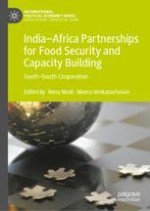2021 | OriginalPaper | Chapter
2. India and Africa: Is the Cooperation Sustainable?
Author : Gurjit Singh
Published in: India–Africa Partnerships for Food Security and Capacity Building
Publisher: Springer International Publishing
Activate our intelligent search to find suitable subject content or patents.
Select sections of text to find matching patents with Artificial Intelligence. powered by
Select sections of text to find additional relevant content using AI-assisted search. powered by
